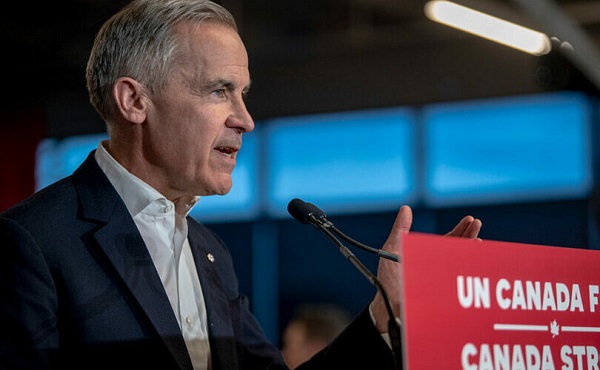Daily Caller
‘Explore Every Action Necessary’: Here’s How Trump Admin, GOP May Change Fight Against Mexican Cartels


From the Daily Caller News Foundation
By Jason Hopkins
“When I am back in the White House, the drug kingpins and vicious traffickers will never sleep soundly again.”
The Trump transition team and congressional Republicans have promised an unprecedented immigration crackdown, which could also include a novel approach to combating drug cartels.
President-elect Donald Trump’s immigration platform includes a number of hardline measures, such as resuming construction on the U.S.-Mexico border wall, reviving the Remain in Mexico program for asylum seekers, conducting the largest deportation operation in U.S. history and a number of other hawkish proposals. Trump allies and upcoming administration officials have also called on the U.S. to officially designate key drug cartels as terrorist organizations, which would open more resources to combating the crime syndicates that have long sowed chaos at the southern border.
“The drug cartels are waging war on America — and it’s now time for America to wage war on the cartels,” then-candidate Trump said in December 2023, and declared that his plan to fight the cartels included designating them as foreign terrorist organizations.
“Millions and millions of families and people are being destroyed,” he continued. “When I am back in the White House, the drug kingpins and vicious traffickers will never sleep soundly again.”
Nearly a year after that announcement was made, Trump is now due to return to the White House for a non-consecutive second term, bringing his proposal for cartels far closer to reality.
Former Immigration and Customs Enforcement acting director Tom Homan — who Trump recently tapped to serve as his immigration czar — declared that he’d like to see cartels be given the terrorist designation, having said in a news interview in November that they have “killed more Americans than every terrorist organization in the world combined.”
A foreign terrorist organization (FTO) designation by the State Department — which has so far been mostly applied to Islamic terrorist groups that pose a significant threat to American security — would trigger U.S. authorization to freeze financial assets, prohibit entry into the country and prosecute members for supporting terrorism. The proposal itself is not new, as it’s been championed by border hawks over the years.
“What we need to do is make sure that legally we are approaching cartels as the dangerous organizations that they are, and I think an FTO designation is appropriate,” Texas Rep. Chip Roy said to the Daily Caller News Foundation.
Roy was an early proponent in the House of Representatives for this action, having introduced legislation in 2019 that called on then-Secretary of State Mike Pompeo to designate cartels as terrorists. The Texas lawmaker introduced a bill in 2023 that called for the Gulf Cartel, Cartel Del Noreste, Cartel de Sinaloa, and Cartel de Jalisco Nueva Generacion to be given the FTO designation.
While the incoming Trump administration appears to be fully on board with this approach, it remains to be seen if it can be done. Trump himself explicitly called for drug cartels to be labeled as terrorists in November 2019 — largely in reaction to the massacre of American Mormons living south of the border by drug lords earlier that month — but those plans never came to fruition in his first term.
The Mexican government has also long opposed the idea of FTO designation for drug cartels, believing the approach to largely be an affront to their national sovereignty.
In a statement to the DCNF, Todd Bensman, who serves as a senior national security fellow for the Center for Immigration Studies, said he doesn’t “outright oppose the idea” of an FTO designation, but noted that a cartel organization can employ tens of thousands of individuals. For this reason, careful scope would be needed so U.S. officials are not overwhelmed as they carry out their counterterrorism mission.
Roy argued that a specific FTO designation isn’t completely necessary, but some sort of formal action is needed in order to fully take on the threat of these drug cartels.
“We can get hung up with words and designations and whatever,” the Texas lawmaker said. “Alright, if you want to come up with a special designation that’s the equivalent, then so be it.”
“But the bottom line is that we need to designate them as the dangers that they are and then be able to take action with the full tools at our disposal,” Roy continued. “We need to explore every action necessary to stop them.”
On Election Day, Republicans won control of not only the White House and the Senate, but also maintained their majority in the House of Representatives, which will allow the Trump administration to more freely foment its agenda to control illegal immigration and tackle crime emanating south of the U.S.-Mexico border. Roy urged lawmakers to get behind the White House to push these goals over the finish line.
“What we need is the executive branch to act and we need the legislature to give the executive branch the tools necessary to act,” Roy said. “We can’t blink. We need to move now.”
Daily Caller
AI Needs Natural Gas To Survive


From the Daily Caller News Foundation
By David Blackmon
As recent studies project a big rise in power generation demand from the big datacenters that are proliferating around the United States, the big question continues to focus in on what forms of generation will rise to meet the new demand. Most datacenters have plans to initially interconnect into local power grids, but the sheer magnitude of their energy needs threatens to outstrip the ability of grid managers to expand supply fast enough.
This hunger for more affordable, 24/7 baseload capacity is leading to a variety of proposed solutions, including President Donald Trump’s new executive orders focused on reviving the nation’s coal industry, scheduled to be signed Tuesday afternoon. But efforts to restart the permitting of new coal-fired power plants in the US will require additional policy changes, efforts which will take time and could ultimately fail. In the meantime, datacenter developers find themselves having to delay construction and completion dates until firm power supply can be secured.
Datacenters specific to AI technology require ever-increasing power loads. For instance, a single AI query can consume nearly ten times the power of a traditional internet search, and projections suggest that U.S. data center electricity consumption could double or even triple by 2030, rising from about 4-5% of total U.S. electricity today to as much as 9-12%. Globally, data centers could see usage climb from around 536 terawatt-hours (TWh) in 2025 to over 1,000 TWh by 2030. In January, a report from the American Security Project estimated that datacenters could consume about 12% of all U.S. power supply.
Obviously, the situation calls for innovative solutions. A pair of big players in the natural gas industry, Liberty Energy and Range Resources, announced on April 8 plans to diversify into the power generation business with the development of a major new natural gas power plant to be located in the Pittsburgh area. Partnering with Imperial Land Corporation (ILC), Liberty and Range will locate the major power generation plant in the Fort Cherry Development District, a Class A industrial park being developed by ILC.
“The strategic collaboration between Liberty, ILC, and Range will focus on a dedicated power generation facility tailored to meet the energy demands of data centers, industrial facilities, and other high-energy-use businesses in Pennsylvania,” the companies said in a joint release.
Plans for this new natural gas power project follows closely on the heels of the March 22 announcement for plans to transform the largest coal-fired power plant in Pennsylvania, the Homer City generating station, into a new gas-fired facility. The planned revitalized plant would house 7 natural gas turbines with a combined capacity of 4.5 GW, enough power 3 million homes.
Both the Homer City station and the Fort Cherry plant will use gas produced out of the Appalachia region’s massive Marcellus Shale formation, the most prolific gas basin in North America. But plans like these by gas companies to invest in their own products for power needs aren’t isolated to Pennsylvania.
In late January, big Permian Basin oil and gas producer Diamondback Energy told investors that it is seeking equity partners to develop a major gas-fired plan on its own acreage in the region. The facility would primarily supply electricity to data centers, which are expected to proliferate in Texas due to the AI boom, while also providing power for Diamondback’s own field operations. This dual-purpose approach could lower the company’s power costs and create a new revenue stream by selling excess electricity.
Prospects for expansion of gas generation in the U.S. received a big boost in January when GE Vernova announced plans for a $600 million expansion of its manufacturing capacity for gas turbines and other products in the U.S. GE Vernova is the main supplier of turbines for U.S. power generation needs. The company plans to build 37 gas power turbines in 2025, with a potential increase to over 70 by 2027, to meet rising energy demands.
The bottom line on these and other recent events is this: Natural gas is quickly becoming the power generation fuel of choice to feed the needs of the expanding datacenter industry through 2035, and potentially beyond. Given that reality, the smart thing to do for these and other companies in the natural gas business is to put down big bets on themselves.
David Blackmon is an energy writer and consultant based in Texas. He spent 40 years in the oil and gas business, where he specialized in public policy and communications.
Business
Scott Bessent Says Trump’s Goal Was Always To Get Trading Partners To Table After Major Pause Announcement


From the Daily Caller News Foundation
By
Secretary of the Treasury Scott Bessent told reporters Wednesday that President Donald Trump’s goal was to have major trading partners agree to negotiate after Trump announced a 90-day pause on reciprocal tariffs for many countries after dozens reached out to the administration.
Trump announced the pause via a Wednesday post on Truth Social that also announced substantial increases in tariffs on Chinese exports to the United States, saying 75 countries had asked to talk. Bessent said during a press event held alongside White House press secretary Karoline Leavitt that Trump had obtained “maximum leverage” to get trading partners to negotiate with the April 2 announcement of reciprocal tariffs.
“This was his strategy all along,” Bessent told reporters during an impromptu press conference at the White House. “And that, you know, you might even say that he goaded China into a bad position. They, they responded. They have shown themselves to the world to be the bad actors. And, and we are willing to cooperate with our allies and with our trading partners who did not retaliate. It wasn’t a hard message: Don’t retaliate, things will turn out well.”
Dear Readers:
As a nonprofit, we are dependent on the generosity of our readers.
Please consider making a small donation of any amount here.
Thank you!
WATCH:
China imposed retaliatory tariffs on American exports to the communist country Wednesday, imposing an 84% tariff on U.S. goods after Trump responded to a 34% tariff by taking American tariffs to 104%.
“Based on the lack of respect that China has shown to the World’s Markets, I am hereby raising the Tariff charged to China by the United States of America to 125%, effective immediately,” Trump said. “At some point, hopefully in the near future, China will realize that the days of ripping off the U.S.A., and other Countries, is no longer sustainable or acceptable.”
“They kept escalating and escalating, and now they have 125% tariffs that will be effective immediately,” Bessent said during the press conference.
Bessent said that China’s actions would not harm the United States as much as it would their own economy.
“We will see what China does,” Bessent said. “But what I am certain of, what I’m certain of, is that what China is doing will affect their economy much more than it will ours, because they have an export-driven, flood the world with cheap export model, and the rest of the world now understands.”
The Dow Jones Industrial average closed up 2,962.86 points Wednesday, with the NASDAQ climbing by 1,755.84 points and the S&P 500 rising 446.05 points, according to FoxBusiness.
-

 2025 Federal Election2 days ago
2025 Federal Election2 days agoResearchers Link China’s Intelligence and Elite Influence Arms to B.C. Government, Liberal Party, and Trudeau-Appointed Senator
-

 Business1 day ago
Business1 day agoCanadian Police Raid Sophisticated Vancouver Fentanyl Labs, But Insist Millions of Pills Not Destined for U.S.
-

 2025 Federal Election2 days ago
2025 Federal Election2 days agoPoilievre Announces Plan To Cut Taxes By $100,000 Per Home
-

 2025 Federal Election2 days ago
2025 Federal Election2 days agoTwo Canadian police unions endorse Pierre Poilievre for PM
-

 2025 Federal Election21 hours ago
2025 Federal Election21 hours ago‘Sadistic’ Canadian murderer claiming to be woman denied transfer to female prison
-

 2025 Federal Election18 hours ago
2025 Federal Election18 hours agoTaxpayers urge federal party leaders to drop home sale reporting to CRA
-

 2025 Federal Election2 days ago
2025 Federal Election2 days agoCarney needs to cancel gun ban and buyback
-

 2025 Federal Election2 days ago
2025 Federal Election2 days agoMark Carney vows to provide sterilizing puberty blockers to children ‘without exception’






